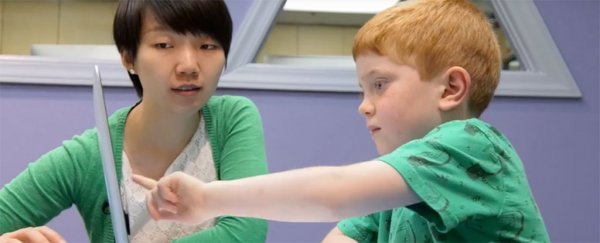If you're the kind of person who fears having to solve mathematical problems, the results of a new study might improve your confidence and stimulate your maths abilities at the same time – and all thanks to our intuitive sense in judging quantities.
Researchers have shown that the arithmetic performance of kindergarteners can be boosted in a matter of minutes, just by playing a simple number game that appears to warm up their cognitive processes.
"Math ability is not static – it's not the case that if you're bad at math, you're bad at it the rest of your life. It's not only changeable, it can be changeable in a very short period of time," said researcher Jinjing 'Jenny' Wang from Johns Hopkins University. "We used a five-minute game to change kids' math performance."
In the game, blue and yellow dots flash quickly on two separate sides of a computer screen, and the player simply has to indicate whether more blue or yellow dots appeared. The dots disappear too quickly to be actually counted, so playing the game relies on a person's innate sense of numbers and quantities.
This sense, which researchers call the "approximate number system" is something we have even as very young children, and while it's very different to the more rigorous and complicated rules of mathematics we learn later in life, scientists think there's a link between the abilities.
Wang and her team tested the 5-minute game with 40 five-year-olds, to see how it affected their mathematical ability.
The children were divided into three groups, each playing the dots game on a different setting: easy but gradually getting harder; hard all the way through (involving lots of dots to quickly get a sense of); and a mixture of easy and hard for the control group.
After the session, the children took a vocabulary quiz or a math quiz. While the researchers didn't detect any change in the children's vocabulary skills as a result of playing the number game, the maths quiz – which was based on a standardised maths assessment test – offered some interesting results.
The kids who started the number game on the easy setting (with questions gradually getting harder) scored significantly higher on the maths test, averaging about 80 percent, as a result of warming up their number sense beforehand.
By contrast, the group who started with hard questions scored only 60 percent on the test, and the control group – who received a mix of easy and hard questions – scored in the middle with 70 percent.
With only 40 children tested in this study, it's clear that these results should be taken with a grain of salt until they can be replicated in research with a significantly larger sample.
But this isn't the first time the approximate number system has been linked to mathematics performance in children. Two previous studies involving some of the same researchers – published in 2008 and 2011 – also found ties between children's precision with the approximate number system and better results in school mathematics.
If the current findings can indeed be replicated elsewhere, it seems to suggest that this extremely simple game can actually improve children's mathematical ability in the short term – although it's unclear how long the effects would last for, and we don't know whether older people calculating adult-level mathematics would see similar kinds of benefits.
"That's the big question," said Wang. "If we can improve people's intuitive number ability, can we also improve their math ability?"
The researchers now want to see if there's a way that this technique could somehow achieve lasting results for those who play the game.
"These findings emphasise the sense in which core cognition, seen across species and across development, serves as a foundation for more sophisticated thought," said one of the team, Lisa Feigenson.
"Of course, this raises the question of whether this kind of rapid improvement lasts for any significant duration, and whether it enhances all types of math abilities," she added. "We're excited to follow up on these questions."
You can see a video explaining more about the research below.

The findings are reported in the Journal of Experimental Child Psychology.
